The law relating to the defence of insanity is out dated and unsatisfactory. Reform is long overdue in the interests of both justice and common sense. Evaluate the accuracy of this statement.
The law relating to the defence of insanity is out dated and unsatisfactory. Reform is long overdue in the interests of both justice and common sense. Evaluate the accuracy of this statement.
Insanity, also known as insane automatism, is a defence which is defined in purely legal terms as opposed to a medical definition. There has been widespread criticism of the law relating to insanity, it has been described as unsatisfactory and out dated, with reform ‘’long overdue’’ not only in judicial terms, but common sense.
The rules relating to insanity originate from the M’Naughton rules, set out in 1843. These rules were created following public outcry following the decision in M’Naughton (1843), and stated that jurors ought to be told ‘’in all cases, everyone is presumed sane’’ and to possess ‘’a sufficient degree of reason to be responsible for his crimes, until the contrary be proven to their satisfaction’’, which basically means that the defendant is automatically responsible for their crimes unless proven otherwise, or guilty until proven innocent. To establish a defence on the grounds of insanity, it must be clearly proven that at the time of committing the act the accused party was labouring under such a defect of reason, from disease of the mind as to not know a. The nature and quality of the act he was doing, or if he did know it then b. that he did not know what he was doing was wrong in law. The main point of critique here is that these laws were created in 1843, that is 168 years ago! For a legal definition of any form to not be updated in that length of time is astonishing, but especially where mental health is concerned given the immense medical advances and breakthroughs that have occurred in this field in the last 20 years, never mind the last 168 years! A more modern definition is needed to accommodate these advances not only in medical science, but in English language. The old fashioned terminology in the M’Naughton rules may sound offensive, e.g. to a diabetic who has been labelled ‘insane’. If a defendant is not guilty by reason of insanity, the judgement comes under another old fashioned law called the Trial of Lunatics set out in 1883. Surely Parliament can repeal and modernise here. The M’Naughton rules are also too restricted, one example of this is because they do not cover a defendant who is subject to an irresistible impulse that he knows is wrong, but cannot control it, such as Byrne. Another obvious criticism is that these rules which define insanity are a strictly legal term - there is no link what so ever between medical insanity and legal insanity, so the statement is accurate in suggesting reform in the interest of common sense.








